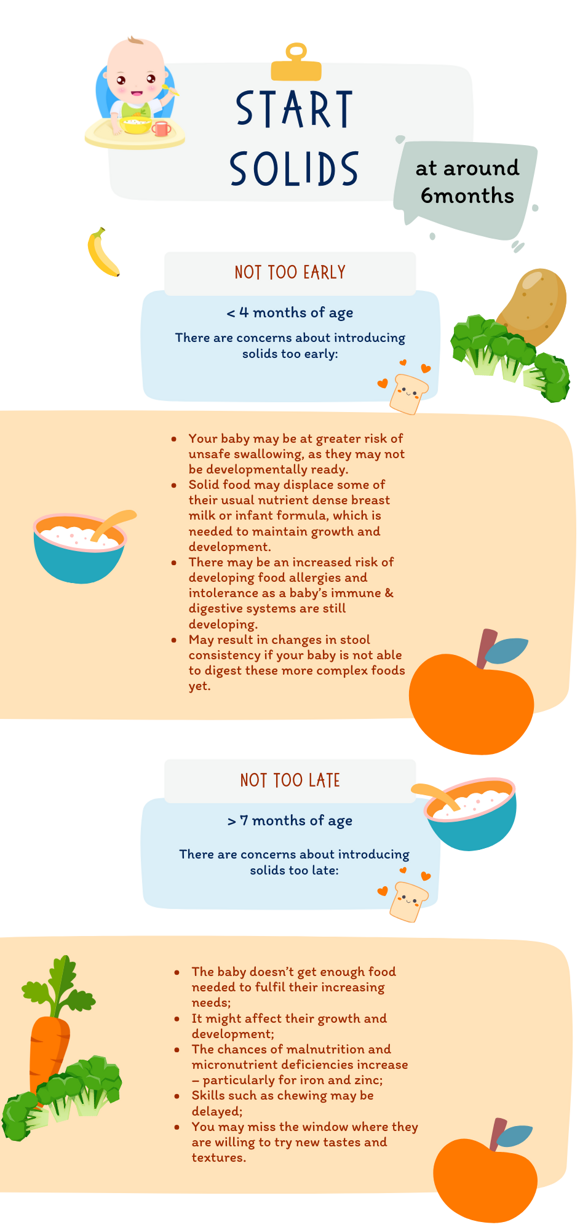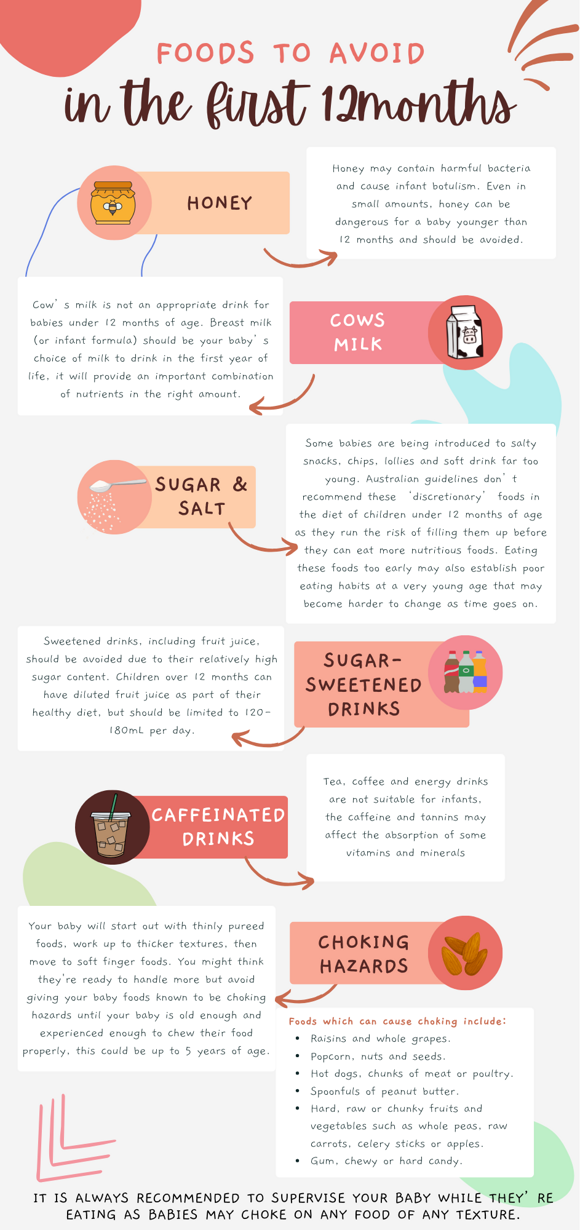
Our Australian Guidelines recommend introducing solids to infants at around 6 months of age, and definitely not before 4 months of age. At around 6 months, introducing solid foods is needed in addition to breast milk (or infant formula) to meet additional energy and nutrient needs such as iron which your breast milk will no longer provide.
- The age of your baby is only one indication that they are ready for solid food, there are a number of other visual cues to look out for.
- The order in which you introduce new foods doesn’t matter as long as they are iron-rich, and an appropriate texture.
- Where possible, you should continue to breastfeed during and after the starting on solids.
- If you are unsure your baby is ready for solids, consult your healthcare professional for advice.
When to start introducing solids to infants
Young babies have yet to develop the skills needed to move solid foods around in their mouth and successfully swallow. By around 6 months of age, your baby will have developed the motor skills needed to start on solids. They will be able to sit up during feeding, draw food off a spoon, and turn their head away when full.
While the age of your baby is one factor to consider when introducing solid foods to your baby, it will also depend on the individual baby and their signs of readiness. The following list are some cues to look out for, that show your baby is ready for solids:
- Your baby is showing an interest in food, including what’s on your plate – babies might also start putting their fingers in their mouths.
- You’ve noticed an increased appetite and the want for more milk at the end of a breastfeed.
- Your baby is opening their mouth when food is offered on a spoon.
- Your baby has good head and neck control, and the ability to sit upright when supported.
If your baby is not showing these readiness signs by around 6 months of age and you are worried that their appetite, growth and development are not progressing normally, it is advisable to seek advice from your doctor or dietitian.
Do not force:
This is one of the most important stages of growing up. Good nutrition will play an important role in their entire life so it is important to start them on the right track from the beginning and let it happen at a natural and supportive pace.

Starting on Solids: Phases to the first bite
When your baby is ready to start taste testing foods, offer your baby their first solids after a breast feed when they are happy, alert and interested. There are three progressive stages when introducing solids to your infant, and you can progress through these as it suits your little one. Read our guide to introducing solids below:
Stage 1: Introduce Purees
This step usually begins with iron-fortified smooth baby cereals (mixed with cooled-boiled water or breast milk), and other iron containing foods including finely pureed meat and fish. Vegetables, fruits and dairy foods can then be introduced, made into a smooth consistency using a baby food processor, handheld food processor or blender. We have a number of puree recipes on our website, why not start with this easy Cauliflower Cream recipe.
Start with a few mouthfuls once or twice a day after breastfeeds. Slowly increase the portion to about a quarter of a cup as your baby tolerates and shows signs they want more. This is the step that is usually skipped if you decide to choose baby-led weaning (BLW) as a method of introducing solids.
Follow the right process
Australian recommendations suggest starting with pureed iron containing foods, including iron-fortified infant cereals, pureed meats, poultry and fish (all sources of highly absorbable haem iron), or cooked tofu and legumes (sources of non-haem iron). After this, the order in which you introduce different healthy foods, or the number of new foods introduced at any one time, doesn’t really matter.
Monitor for signs of intolerance and allergy
Australia has one of the highest rates of food allergy in the world and there is much debate as to why this is happening. The current recommendation is not to delay the introduction of any highly allergenic foods. Introduce new foods one at a time, and early in the day, to help monitor for reactions. Reactions can be mild or severe and may happen within minutes or take hours after a food has been eaten. If you are concerned, or your baby develops a rash, swelling, diarrhoea or vomiting, seek medical attention without delay.
Stage 2: Introduce lumps
A few weeks or so after the introduction of purees, you can start experimenting with soft lumpy foods. As most babies don’t have teeth yet it is important to keep the lumps soft. The lumps help your baby to develop chewing skills and develop tongue strength which adds to the development of speech. Add well-cooked barley or beans to their meals; use a potato masher to mash fruit and vegetables instead of a blender or food processor. Soft fruit like avocado and banana are instant baby foods that only require a little mashing.
Stage 3: Finger foods
By ages 8 to 10 months, most babies can handle small portions of chopped finger foods, such as soft fruits, pieces of steamed vegetables, cooked egg, cheese, soft meats and fish. As your baby approaches their first birthday, mashed or chopped versions of whatever the rest of the family is eating will become your baby’s main fare. Continue to offer breast milk or infant formula with and between meals. In baby-led weaning (BLW), this step is usually started earlier than recommended here.
Solid foods to start with
Iron is one important nutrient babies will need at this age, so the first foods introduced should be rich in iron. Pureed meat is a great source of iron and recommended as one of your child's first foods. Iron-fortified infant cereals are another great option. Not only are they designed to provide essential nutrients in a small serving, perfect for a small tummy that can’t hold much food at one time, but they are soft and easy to swallow. Start with a thinner consistency, and move to a thicker texture as your baby gets used to eating from a spoon. Introducing new textures and flavours at the appropriate time is important in reducing the risk of later feeding difficulties and establishing healthy eating habits.
- Start with infant rice cereal. Offering only single-grain cereals at first lets you pinpoint any possible food sensitivities or reactions—such as a rash, diarrhoea or vomiting—your baby may have to a new food.
- Prepared infant cereal should never be fed from a bottle—only from a spoon.
- When first starting infant cereal, mixing with breast milk or baby’s usual milk is a great way to slowly introduce new flavours. Move to a thicker consistency once you feel your baby is mastering the thin texture.
- Prepare only as much as you think they will eat. Discard any leftover infant cereal after the meal, don’t keep it as it may grow bacteria very easily.
Tip: Introduce common allergenic foods one at a time. This will help identify the problem food if there is an allergic reaction. Australia’s leading Allergy experts (ASCIA) recommend that parents don’t delay or avoid the introduction of potentially allergenic foods. Future research and evidence may find that there are optimal timings for introduction for individual allergenic food. If you suspect a reaction, stop feeding your baby that new food and speak to your healthcare professional.
Tips for baby’s first spoonful and avoiding food refusal.
- Offer your baby breastmilk or your baby’s formula feed before solids so they won’t be fussy or too hungry.
- Take your time. Choose a time of day you don’t have to rush.
- Choose the appropriate spoon. Use a small, baby-sized round-tipped soft reusable spoon to protect your baby’s tender gums. Read our handy list on other items you may need when introducing solids.
- Sit them in an upright infant seat or high chair, making sure their head is in an upright position.
- Let them explore. Place a small amount of puree or infant cereal on their high chair tray so they can "finger paint" with it and become familiar with its texture. Let your baby explore the feel and smell of the food. This is both fun and messy! Keep your sense of humour and keep the camera handy for pictures.
- First Bite! Sit facing your baby and hold a half-spoonful of food about 30cm from their face. Get their attention and put the spoon up to their mouth. For the first taste, try putting a dab of food on their lip. If they're agreeable to that first taste, put the next spoonful into their mouth when they open it. Feed your baby as slowly as they want and always look for fullness cues. It’s all about the experience!
- Try, try again. Don’t be surprised if your baby’s first mouthful pops right back out. It’s a natural reflex. If your baby seems unhappy about this experience, give it up for now and try again later.
Tip: Breast milk (or infant formula) is still your baby’s main source of nutrition. This is a time of introducing new flavours and textures to your baby, a time of exploration.

Introduce wholesome foods when starting your baby on solids – try our 6-8-month-old menu
This sample day was created by accredited practising dietitians to help meet the nutrition goals of a 6- to 8-month-old baby. Your child may eat more or less, so always follow their hunger and fullness cues. Your baby’s feeding skills will develop over time, once they’ve mastered the pureed foods to start with, move onto soft mashed and then finger foods at around 8 months of age.
How much solid food should I feed my baby?
Start with 1-2 teaspoons after breastfeeding or your baby’s formula when first introducing solid foods. As your baby grows and develops, look for signs they are ready for more solid food, and slowly increase the volume to 1-2 tablespoons or more according to your baby’s appetite. See this article for common hunger and fullness cues in babies.
Morning feeding
- Breast milk or infant formula (cow’s milk should not be offered to babies younger than 1 year of age)
Breakfast
- Iron-fortified infant cereal mixed with breast milk or infant formula
- Pureed fruit, such as peaches or pears
Mid-morning snack
- Breast milk or infant formula
Lunch
- Breast milk or infant formula
- Pureed meat
- Pureed vegetables, such as carrots
Afternoon snack
- Breast milk or infant formula
Dinner
- Breast milk or infant formula
- Iron-fortified cereal mixed with breast milk
- Pureed fruit
Evening feeding
- Breast milk or infant formula
The importance of breast milk and infant formula whilst introducing solids to infants
When introducing solid foods to your baby, breast milk and infant formula continue to play a vital role in their diet. Breast milk or formula provides essential nutrients, and hydration that complement the nutritional value of solid foods. It ensures that your baby receives a balanced and complete diet, supporting their growth and development. Breast milk or formula should still be the primary source of nutrition during the first year, gradually transitioning to a variety of solid foods while maintaining regular breastfeeding or formula feeding sessions. Consult with your healthcare professional for personalised guidance on starting solids and maintaining a healthy feeding routine for your baby.
What to expect after your baby has started solids?
There is much more to starting solids than simply being ready to chew and swallow foods. Your baby will progress through many stages of eating development. These stages may include tolerating a range of foods and meals with different:
- Textures – rough, slimy, crunchy, fibrous
- Tastes - such as bitter, sour, salty, sweet, savoury
- Consistencies - runny, thick, chunky
- Smells – stronger and milder smells
- Temperature – warm, cold, icy
- Appearance – all food looks foreign to children to begin with, just as when we visit a different country with foreign food, it’s normal for children to be a little apprehensive at first
- Thirst – compared to hunger
- Chewing
- Amount of food on the spoon
- Sizes of the meal
- Times between meals.
When eating development goes smoothly you may not even notice these changes happening, however if it is less smooth – then the above become more important to watch out for. Focus on areas where you haven't noticed your baby taking an interest.
Even easy-feeding babies can refuse foods at times for various reasons, just knowing food introductions is supposed to be a learning curve for both baby and parent can put some parents at ease. Offering a variety of foods, flavours and textures is important throughout their solid foods journey. We have a number of baby food recipes to support your little foodie.
FAQs
When to introduce solids?
Australian infant feeding guidelines recommend introducing solids to your baby at around 6 months of age. Signs of readiness include sitting up with support, showing interest in food, and being able to coordinate tongue movements. As every baby is different it's important to consult with your healthcare professional for personalised guidance based on your baby's development and needs.
How to introduce solids?
When introducing solids, start with single-ingredient purees, such as mashed fruits or vegetables, gradually increasing variety and texture. Offer small spoonful’s and observe your baby's cues for hunger and fullness. Begin with one meal a day after a breastfeed (or infant formula) and gradually progress to more meals while continuing to breastfeed or provide infant formula as the main source of nutrition, until 12 months of age.
Sources:
Raising Children Network. Accessed at: https://raisingchildren.net.au/babies/breastfeeding-bottle-feeding-solids/solids-drinks/introducing-solids
National Health and Medical Research Council 2012, Infant Feeding Guidelines. Australian Government, Canberra. Accessed at https://nhmrc.gov.au/about-us/publications/infant-feeding-guidelines-information-health-workers
ASCIA 2020 Infant Feeding and Allergy Prevention. Accessed at https://www.allergy.org.au/images/pcc/ASCIA_Guidelines_Infant_Feeding_and_Allergy_Prevention_2020.pdf






